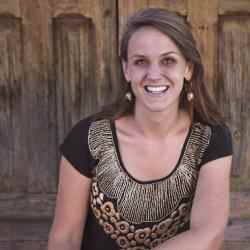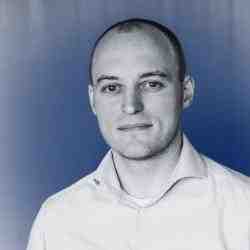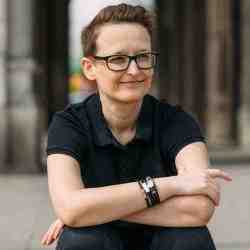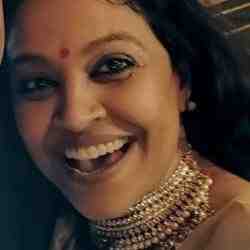Introduction
In the midst of struggle to fight against Lupus the unknown disease, Dian Wahdhini Syarief, a person living with Lupus and low vision, is building a supporting system engaging stakeholders to ensure the survival of people with Lupus in Indonesia.
The New Idea
While others focus on campaign and building exclusive community of people living with Lupus (Odapus) or SLE (Systemic Lupus Erythematosus) –a systemic autoimmune disease, Dian is building the supporting system where Odapus and Low vision (LV) could live longer and healthier. To ensure the health system is available, Dian works with the District Health offices assisting doctors and nurses at the sub-district health clinics aware of SLE and improve their skills in early diagnosis and treatment. She has also partnered with 100 volunteer doctors for Lupus (Dokter Pemerhati Lupus) who then set up Health Center for Lupus in different public ehospitals (Yang men set up Lupus centre adalah para dokter pemerhati Lupus).As medication and laboratory test are costly, Dian engages pharmacies and laboratories to provide discounted price for Odapus. She is also proposing to the Health Ministry, pharmaceutical companies and hospitals to ensure the equal distribution of drugs for Lupus for the poor and in remote areas. In mobilizing public support for Odapus, Dian engages researchers to find immunosuppressant from natural resources. While doing a creative campaign by selling among others music album, audio book and Ring Back Tone on Lupus, Dian is mobilizing people to support her work sustainably. Currently about 500 Odapus joined in her Lupus Community and set up online peer support group to facilitate communication and information exchange from Odapus in remote areas including those who live abroad. In addition to working with her Lupus Community to spread her work and connect to other groups, Dian has also been working with the Health Ministry to develop operation guidance to address SLE including among others planning in Ministry resources deployment, preparing Ministerial Decree for drug pricing and distribution control, Standard Operating Procedure and referral system for hospitals and health clinics’.
The Problem
Estimated around 300,000 in Indonesia and over 5 million globally, people live with SLE This number could increase drastically as many people cannot yet be detected. Furthermore, the symptoms vary greatly from person to person. The prevalence rate per case is amongst 500-1000 people with women have a much higher ratio than men (9 women : 1 man) during their productive years (15-45). Even though it has been found since the 13th century, SLE is still incurable. Currently the average 10-year survival rate has been more than 90% compared to less than 50% of 5-year survival in 1955. Nonetheless, the mortality rate could be pushed further down when there is early diagnosis and treatment for LSE, and drug medications are accessible and affordable. Odapus in Indonesia are still struggling unfortunately, as there is no system in place to support them. In the medical service, there are not a lot of doctors aware and have the skills to conduct early diagnosis. Or they may take a long time to diagnose, since the symptoms come and go and mimic many other illnesses. Due to the challenge, Odapus often have misdiagnosed and got mistreatment. No procedure operating system is in place for the health providers, especially in public health clinics to handle the suspected patience. For those who have been diagnosed, medical drugs prescribed by the doctors are expensive and inaccessible especially for Odapus who are poor and live in remote areas. The lower income bracket would otherwise let the disease untreated as they are unfortunately cannot afford the doctor fee nor the medication.While medical science has not yet developed a method of curing lupus, very few researchers have the interest to bring new findings to support the lives of Odapus. Although there are already attempts done by the government and different organizations to promote Lupus, the general public is still not aware of the disease. Some are not able to identify the symptoms and others do not know how to help. In addition to the medical challenges, psychological problems like stress and depression are common in Odapus. Moreover, some Odapus have to also deal with impaired vision (from low vision to blindness). Many Odapus and low vision become unproductive labor force and quit from their job, or students are absence from their school. Some organizations set up peer support group, however they are exclusive.
The Strategy
Dian develops partnerships with different stakeholders including Odapus families and the wider society to improve the lives of Odapus and Low vision. In doing so Dian together with Syamsi Dhuha Foundation (SDF), a non-governmental organization she has co-founded with her husband in 2003, employ multiple pronged strategies. By developing cooperation and partnership with other agencies, Dian has taken an important role to ensure SLE and LV medication and health services come into exist. She lobbied the government to provide better health system for Odapus. Since 2006, she and SDF have been conducting official hearings to the Health Minister to propose the generic drugs. for SLE to be included in the Jamkesmas’ (Community Health Insurance) drug list. She is also working with the Health Ministry to develop SLE operation guidance in how to deploy the Ministry resources and develop Standard Operating Procedure and referral system for hospitals and health clinics. In the following year she submitted a proposal to the Health Ministry for Lupus Drug Special Line (JASUSPUS), which would make the drugs available and distributed evenly to remote areas in affordable price. Not only with the government, Dian also works with the private sector. In Bandung city where her work has been piloted, she developed cooperation with pharmaceutical and Laboratory Company, which enables Odapus to get the drugs and the lab test service with 10-25 percent discounted price. In support of building the health system, Dian develops capacity building activities for the health service providers so that they have a better understanding in LSE and its medication. Under the coordination of the District Health office, medical training and workshops are held for hundreds of doctors from Community Heath Centers (Puskesmas). To channel the information across other doctors and medical staff, Dian develops ‘doctors care for Lupus’ community. Through this community, the doctors are encouraged to set up Lupus clinic in the general hospitals. (this is not because of Dian’s works. It is Doctor’s initiaviative) Key to the survival of the Odapus is their psychological and mental capacity to live their lives willingly. Dian then set up the Odapus and LV community for them to better understand and know how to handle the SLE and LV symptoms and flares. They together develop a support system where they can talk to and share with each other to release complains and reduce the pains. In the community they also exercise spiritual healing practices in order to strengthen their soul. With the motto, “the body can be ill, but the soul remains healthy”, Dian encourages her peers to be positive and prevent themselves from being hopeless. She also set up an Online Support Group where Odapus can communicate through the Internet and share their experience in handling the disease. From her fund raising activities Dian is able to provide limited financial assistant scheme for the poor Odapus and LV. With the support, they can access health services such as home/hospital/clinic visits either for psychological counseling, medical examination or medication. With these activities they now treat SLE and LV as a friend instead of enemy (disease). Currently, 500 Odapus and LV join the SDF Lupus community, where 450 of them are Odapus and 50 LV. To encourage public engagement Dian develops sustainable mechanisms both to increase awareness and mobilize resources. She published educational and motivational books and music album with titles among others The Miracle of Love, Journeying With Lupus Towards God (Book and Audio Book-2008), Care for Lupus (Music Album 2009), Luppy My Cheeky Friend (2010), Oops .. my Luppy is Naughty (2011) and Luppy Notes Medical Diary (2012). She also sells RBT (Ring Back Tone) with music about Lupus. To engage journalists SDF provides training about LSE and LV, SDF and their work from which latter she gained mass media coverage and yielded wider public support. Since 2004 SDF carries out series of public events including Lupus Goes to Campus, Walk for Lupus, seminars, workshops and World Lupus Day in collaboration with other parties such as the School of Pharmacy ITB and Hasan Sadikin General Hospital. She also runs World Sight Day in partnership with Cicendo Eye Hospital for the Low vision.In the absence of scientific research on Lupus, Dian is taking a leading role in building and accumulating information about LSE and LV. She encourages researchers to involve in adding the discovery to the body of knowledge. Applying award for award strategy she carries out "Care for Lupus SDF Awards started in 2011 with three categories; first is on research sponsorship aims to promote research on supporting Odapus activities, in particular to look for immunosuppressant from Indonesia’s natural resources. Up until now SDF already provided sponsorship for six researches came from six universities. This year one sub-category under the research category was added : “All About Lupus” for promoting research to improve quality life of Odapus. Second activity is on writing competition aimed to educate and disseminate information about Lupus. And thirdly is a lifetime achievement award designed to acknowledge the fighters who care for Lupus.In addition to national policy advocacy work, Dian also envisions for SDF community to spread to other areas. Through the existing community, Dian encourages Odapus members to develop similar groups in Kalimantan Timur and Bali,. She is utilizing social network and website to communicate and interact with other stakeholders and similar groups to get wider support from other parts of Indonesia.
The Person
Dian was born in Bandung 46 years ago raised by a pharmacologist father and a general practitioner and MBA mother. She was active in scouting and student union at high school and her university at Pharmacy Department, Bandung Technology Institute. Dian learned a lot about life values from her parents, especially her mother. She is a survival cancer and yet with her perseverance and high motivation she continued studying at her 50 year old of age and graduated from her MBA studies. She taught her personal values in becoming independent and not to easily give up. Her father instilled in her values in spiritual strengths. These values equipped her along her life path. Especially when she got the chance to join a students exchange program to Braunschweig, Germany, she learned what being tough and firm means to her life.After graduated from university, she began her career working in a private national bank. Over her ten years of career she assumed several positions in marketing and credit, and served as the Corporate Communications Manager for her final posting. It was not until she reached 34 years old in 1999 that she had to quit the job. She got SLE, which has changed her life completely.The following four years were her life struggle against the pains and suffering from having over 20 major and minor surgeries in her brain, removal of the bladder, uterus, etc. She had to fight her inner struggle against her faith in God questioning why she got all these. However, the experience eventually brought her valuable lessons that changed her life. She found herself being grateful that God loves her so that she could learn more about love and share and help other people.




